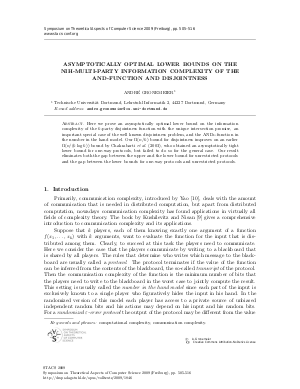Asymptotically Optimal Lower Bounds on the NIH-Multi-Party Information Complexity of the AND-Function and Disjointness
Author Andre Gronemeier
-
Part of:
Volume:
26th International Symposium on Theoretical Aspects of Computer Science (STACS 2009)
Part of: Series: Leibniz International Proceedings in Informatics (LIPIcs)
Part of: Conference: Symposium on Theoretical Aspects of Computer Science (STACS) - License:
 Creative Commons Attribution-NoDerivs 3.0 Unported license
Creative Commons Attribution-NoDerivs 3.0 Unported license
- Publication Date: 2009-02-19
File

PDF
LIPIcs.STACS.2009.1846.pdf
- Filesize: 176 kB
- 12 pages
Document Identifiers
Subject Classification
Keywords
- Computational complexity
- Communication complexity
Metrics
- Access Statistics
-
Total Accesses (updated on a weekly basis)
0Document
0Metadata
Abstract
Here we prove an asymptotically optimal lower bound on the information complexity of the $k$-party disjointness function with the unique intersection promise, an important special case of the well known disjointness problem, and the AND$_k$-function in the number in the hand model. Our $\Omega(n/k)$ bound for disjointness improves on an earlier $\Omega(n/(k \log k))$ bound by Chakrabarti {\it et al.}~(2003), who obtained an asymptotically tight lower bound for one-way protocols, but failed to do so for the general case. Our result eliminates both the gap between the upper and the lower bound for unrestricted protocols and the gap between the lower bounds for one-way protocols and unrestricted protocols.
Cite As Get BibTex
Andre Gronemeier. Asymptotically Optimal Lower Bounds on the NIH-Multi-Party Information Complexity of the AND-Function and Disjointness. In 26th International Symposium on Theoretical Aspects of Computer Science. Leibniz International Proceedings in Informatics (LIPIcs), Volume 3, pp. 505-516, Schloss Dagstuhl – Leibniz-Zentrum für Informatik (2009)
https://doi.org/10.4230/LIPIcs.STACS.2009.1846
BibTex
@InProceedings{gronemeier:LIPIcs.STACS.2009.1846,
author = {Gronemeier, Andre},
title = {{Asymptotically Optimal Lower Bounds on the NIH-Multi-Party Information Complexity of the AND-Function and Disjointness}},
booktitle = {26th International Symposium on Theoretical Aspects of Computer Science},
pages = {505--516},
series = {Leibniz International Proceedings in Informatics (LIPIcs)},
ISBN = {978-3-939897-09-5},
ISSN = {1868-8969},
year = {2009},
volume = {3},
editor = {Albers, Susanne and Marion, Jean-Yves},
publisher = {Schloss Dagstuhl -- Leibniz-Zentrum f{\"u}r Informatik},
address = {Dagstuhl, Germany},
URL = {https://drops.dagstuhl.de/entities/document/10.4230/LIPIcs.STACS.2009.1846},
URN = {urn:nbn:de:0030-drops-18465},
doi = {10.4230/LIPIcs.STACS.2009.1846},
annote = {Keywords: Computational complexity, Communication complexity}
}
